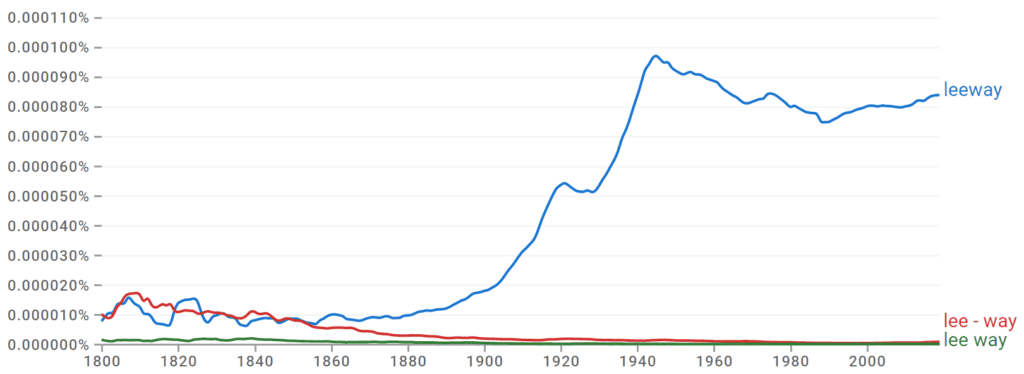Imagine you’re on a ship, sailing through turbulent waters. A gust of wind is pushing you a bit off your intended course. In maritime lingo, this sideways drift is called leeway.
As years passed, this nautical term has navigated its way into our everyday language and embodies a metaphorical sense of freedom or flexibility in decision-making. But how do you spell and use it? Let’s explore the depth of the term leeway.
What Does Leeway Mean?

In a broad sense, leeway is the amount of freedom to move or act that’s available. We use it to indicate a margin of flexibility or an allowance for variation. If someone gives you leeway, they’re providing you some wiggle room or extra space to make your own decisions or choices.
When I book time with my fiction editor, she always gives me a time frame with leeway, which means I get a week of her time, but she usually only needs 4–5 days. The extra time is what you’d call leeway, aka room for error or unexpected changes.
Leeway or Lee way or Lee-way

You’ll probably come across different spelling variations such as lee-way or lee way. However, the correct and most widely accepted form of this word is leeway, one word, no hyphen. This standard form is found in major dictionaries and is the one you’re most likely to encounter in contemporary written and spoken English. But lee-way is also considered a correct noun variant, just not as popular.
The Etymology of the Word Leeway
As I briefly touched on above, the word leeway derives from the domain of sailors and seafarers. Originally, it described the sideways drift of a ship downwind. The term is composed of lee, referring to the side of the ship that was sheltered from winds, and way, meaning course or progress.
As with many other nautical terms, the meaning drifted from literal to figurative, capturing the idea of latitude or freedom to vary from a set course.
Synonyms to Use Instead of Leeway
There’s quite a leeway in terms of synonyms for this versatile word. So, try any of these in place of it to mix up your speech and writing.
- Latitude
- Wiggle room
- Flexibility
- Breadth
- Slack
- Room to maneuver
- Elbow room
- Breathing space
Using Leeway in a Sentence

Let’s anchor the meaning of leeway in some example sentences so you can really see how to apply it.
- My teacher provided some allowance for leeway on the project’s due date, allowing us to submit it by the end of the week instead of tomorrow.
- Given the unpredictable nature of the landscaping job, the team was given a fair amount of sufficient leeway time to complete it.
- She’s a good friend, and I usually give considerable leeway regarding her whimsical and unpredictable plans.
- How much leeway do we have in budgeting for this event? We don’t want to overspend.
- Always give yourself enough leeway when booking and planning for a new book launch.
That’s the Full Sail!
It comes from the seafaring lingo of winds and drifts, but this word has successfully voyaged into the day-to-day vernacular, symbolizing flexibility and a margin for variation. Whether you’re seeking synonyms or crafting sentences, remember that leeway is all about giving that little extra space that can make a world of difference.
Check out some other articles we covered:
